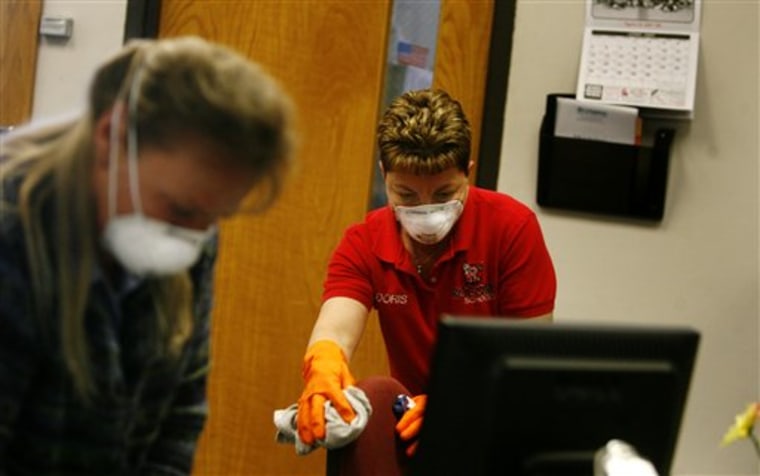Parents wondered who to blame when two neighboring schools in their small central Minnesota town closed because one school had a probable case of swine flu.
Was the virus introduced by a staff member at the cafeteria both student bodies use? Was the patient possibly some student who could have picked up the bug on a spring break trip?
Officials of Rocori Middle School and of nearby private St. Boniface School in the town of Cold Spring couldn't help because they didn't know. And Minnesota health officials wouldn't say.
The absence of information fed a rumor mill that prompted one parent to set the record straight about her daughter's cough.
"I'm sending this to put a rumor to rest," Kim Baumgarten wrote in Thursday's St. Boniface School electronic newsletter, declaring firmly that her daughter "does not have the `Swine Flu.'"
By Thursday, officials said the state's first confirmed case of swine flu was a person with ties to Rocori Middle School in Cold Spring, about 60 miles northwest of the Twin Cities. The patient was expected to make a full recovery, they said.
Additional information, however, was limited.
The spreading swine flu virus poses a dilemma for public health officials trying to balance the need to protect patient privacy against giving out sufficient details to inform the public about a contagion.
States are dealing with the dilemma is various manners:
- Minnesota gives out only the barest details to alert people who may be threatened — where a suspected or confirmed case is found and whether the person is recovering.
- Wisconsin officials have identified the county involved and whether each case involves a child or an adult.
- Massachusetts stayed mum about who contracted that state's first two cases, while local health authorities disclosed that they involved two boys who didn't attend public school.
- Kansas has made known the age group of people infected.
- Missouri officials have given out the gender and age of their probable cases.
Health officials say laws prevent them from giving out identifiable information, although a federal medical privacy law contains exceptions for "public health surveillance, or public health investigation or intervention."
Risks of patient backlash
Wendy Parmet, an expert on public health law at Northeastern University School of Law in Boston, said health emergencies like this pose a challenge.
"Too little information feeds rumors, feeds distrust," Parmet said. "Too much information may lead to panic and stigma and other real harms."
"There's a lot of potential in this outbreak for discrimination, for stigmatizing those who are ill," Parmet added.
Context is key, said James G. Hodge Jr., a professor at the Johns Hopkins Bloomberg School of Public Health.
Knowing that a male young adult is infected in a large city is different than knowing that about a town of 3,000 people, he said. And knowing an infant died from the flu matters more than knowing one merely fell ill.
Hodge, the executive director of the Centers for Law and the Public's Health, said there are risks of patient backlash if authorities say too much.
"They will basically go underground," Hodge said. "It's what happens with HIV. It's what happens with tuberculosis. It's what will happen with swine flu if people believe that their identity will be publicly disclosed because of their pursuit of care or treatment through public health authorities."
In Cold Spring, where Rocori Middle School and St. Boniface elementary school have been closed since Wednesday, the Rocori superintendent has worked to assure people that necessary steps are being taken even though information is limited.
"I know that the entire issue is frustrating and disconcerting," superintendent Scott Staska wrote in a note to parents. "If there were any ability to provide more specific or detailed information, it would help all of us."
Minnesota Health Department spokesman Buddy Ferguson defended the amount of information his agency has made public. The state's second probable case was disclosed Friday and more samples are being tested.
"With these cases we've had so far, we're in a position to follow up directly with anybody who had enough contact with the individual where exposure to the illness would be a concern," Ferguson said. "Anytime we need to tell the public something they need to know to protect themselves, yes we will do that."
